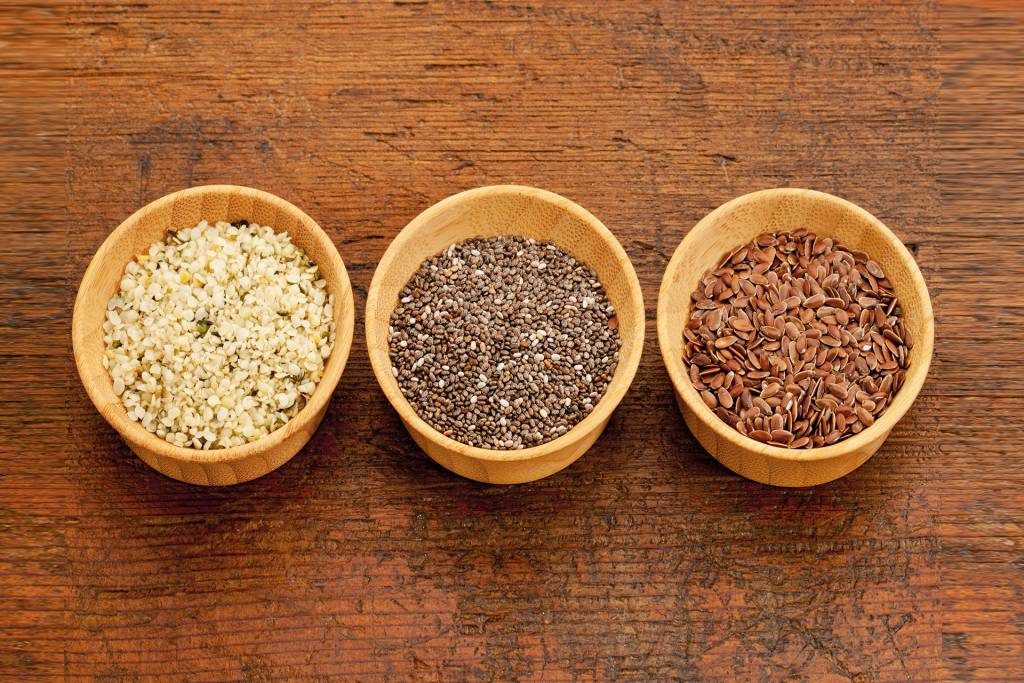It’s a plant-based world—at least that’s what consumers are showing us. New data from SPINS commissioned by Good Food Institute and the Plant Based Foods Association (PBFA) found that total plant-based retail sales reached $5 billion and grew 11% in 2019 (1). An important, health-promoting part of those sales belongs to plant-based sources of omegas.
As Jonny Bowden, Ph.D., CNS, aka The Nutrition Myth Buster, has explained in hisWholeFoodsMagazine column, omega-3s from plant sources are anti-inflammatory molecules that have dozens of benefits documented in peer-review studies (2). Dr. Bowden notes that plant-based omega-3s have to be converted in the body to the omega-3s that are naturally found in sources like wild salmon, so he advises those on a plant-based diet to double (or triple) up on plant sources to make sure enough of it gets converted. Here, some ingredients to consider:
Ahiflower.Ahiflower offers a rich single-plant source of omega-3 ALA (alpha linolenic acid) and SDA (stearidonic acid), omega-6 GLA (gamma linolenic acid) and LA (linoleic acid), and omega-9 OA (oleic acid) (3). As an ingredient, ahiflower oil is versatile: It can be incorporated into foods including dairy and dairy analog beverages, vegetable and fruit juices, oils and dressings, sauces, baked goods, snack foods, soups, and soft candy.
Algae.The use of marine plants is growing in popularity. “Algae oil may not sound very appetizing, but in fact, it is a healthy oil with an excellent fatty acid profile,” Andrew Weil, M.D., shared onwww.drweil.com(4). “Algae oil is high in DHA, one of the two omega-3 fatty acids we need for long-term physical and mental health. Studies have shown that supplementation with DHA from algae oil can lower triglycerides and boost both HDL (‘good’) cholesterol and LDL (‘bad’) cholesterol levels in people without heart disease.” Dr. Weil noted that algae oil is found in fortified foods, and he personally uses it at home for sautéing when he doesn’t want the flavor of olive oil.
Brussels Sprouts.A half-cup of brussel sprouts comes in at just 28 calories, and delivers a wealth of nutrition including vitamin A, vitamin C, vitamin K, potassium, and folate. Like other cruciferous vegetables, Brussels sprouts are also a plant-based source of omega-3 fatty acids, with 135 mg of ALA in each half-cup serving of cooked sprouts (5).
Chia.The chia seed market was valued at $66.5 million in 2018, and the market is projected to register a CAGR of 5.8% to reach a value of $88.1 million in 2024 (6). For those who don’t want to get their omegas in pill form, chia is a great option. Bowden suggests sprinkling black chia seeds on cooked veggies or a tossed salad, or adding to any smoothie. “And while we’re at it, have a look at Chia seed oil—it’s a plant-based omega-3 oil that actually has a higher smoke point than flaxseed oil, so you could cook at low temperatures with it in addition to using it as a salad oil or a drizzle” (7).
Flax.In an EcoWatch article titled “Dr. Hyman: 5 Superfoods Part of a Healthy Diet,” Mark Hyman, M.D., pointed to these tiny treasures as a great source of omega-3 fats, as well as dietary fiber and essential vitamins and minerals. “Flaxseeds have powerful, anti-cancer, hormone-balancing phytonutrients called lignans. Freshly ground flaxseed sprinkled into a smoothie is an excellent way to ease constipation” (8).
Hemp.Hemp seeds provide a concentrated dose of omega-3 fatty acids: one ounce delivers 6,000 mg of ALA omega-3 fatty acids, or 375–545% of the daily recommended intake (9). As researchers explain inNutrition and Metabolism,“Hempseed oil contains all of the essential amino acids and also contains surprisingly high levels of the amino acid arginine, a metabolic precursor for the production of nitric oxide, a molecule now recognized as a pivotal signaling messenger in the cardiovascular system that participates in the control of hemostasis, fibrinolysis, platelet and leukocyte interactions with the arterial wall, regulation of vascular tone, proliferation of vascular smooth muscle cells, and homeostasis of blood pressure” (10).
Perilla.Perilla frutescensseeds, found in Southeast Asia, are rich in ALA, and also deliver omega-6 (linoleic acid) and omega-9 (oleic acid), according to a report inOriental Pharmacy and Experimental Medicine.Author Asif Mohammad notes, “These polyunsaturated fatty acids are most beneficial to human health and in prevention of different diseases like cardiovascular disorders, cancer, inflammatory, rheumatoid arthritis, etc.” (11).
Sacha inchi.The seeds contain omegas 3, 6, and 9, alpha-tocopherol vitamin E, carotenoids, protein, and fiber. AsWholeFoodshas previously reported, Sacha inchi also benefits cholesterol levels and contains tryptophan, which has been shown to raise serotonin in the brain, act as an inflammatory mediator, and help regulate appetite. As an ingredient, sacha inchi has a neutral color and a slightly sweet taste, and can be included in ready-to-drink shakes and beverages, cereal bars, and baking
applications (12).
Walnuts.From improving cognitive health and gut health to warding off heart disease and depression, these nuts are a snacktastic superfood delivering ALA, LA, protein, fiber, magnesium, and more vitamins and minerals. In addition to crunching on the nuts, consumers may want to consider walnut culinary oils.
For more on plant-based sources of omegas, including more research and information on new products, search “plant-based omega” onwww.WholeFoodsMagazine.com.WF










